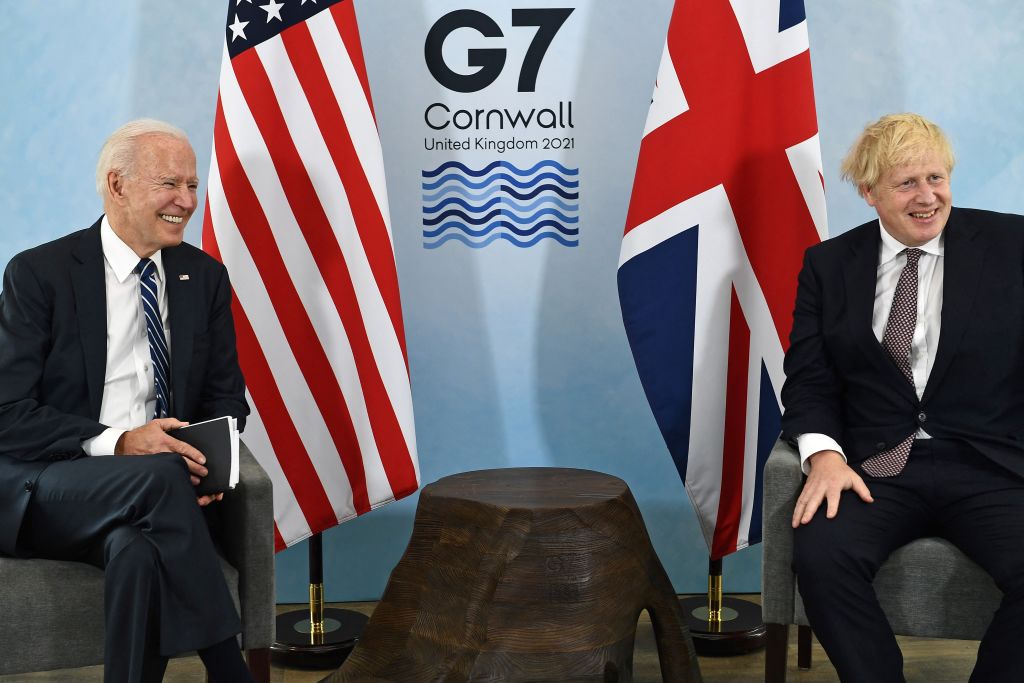G7 countries expected to donate 1 billion COVID-19 vaccine doses worldwide


A free daily email with the biggest news stories of the day – and the best features from TheWeek.com
You are now subscribed
Your newsletter sign-up was successful
On the eve of the Group of Seven summit in England, British Prime Minister Boris Johnson on Thursday night announced that the G7 nations are expected to pledge at least 1 billion COVID-19 vaccine doses to distribute globally.
Earlier, President Biden said that on Friday, the G7 countries — the United States, the United Kingdom, Canada, Japan, France, Germany, and Italy — will share more details on their vaccine donation commitments. The U.S. will donate 500 million doses on top of 80 million doses already pledged, Biden said, adding, "We're going to help lead the world out of this pandemic working alongside our global partners."
The U.S. doses will be manufactured by Pfizer, and will be distributed beginning in August through the COVAX alliance to 92 lower-income countries and the African Union, The Associated Press reports. "Our vaccine donations don't include pressure for favors or potential concessions," Biden said. "We're doing this to save lives, to end this pandemic, that's it. Our values call on us to do everything that we can to vaccinate the world against COVID-19."
The Week
Escape your echo chamber. Get the facts behind the news, plus analysis from multiple perspectives.

Sign up for The Week's Free Newsletters
From our morning news briefing to a weekly Good News Newsletter, get the best of The Week delivered directly to your inbox.
From our morning news briefing to a weekly Good News Newsletter, get the best of The Week delivered directly to your inbox.
The United Kingdom is committed to delivering 100 million vaccine doses, AP says, with the first 5 million going out in the next few weeks. French President Emmanuel Macron on Thursday said his country will share at least 30 million doses by the end of the year, and he believes "the European Union needs to have at least the same level of ambition as the United States. It's almost more important to say how many [doses] we deliver the next month than making promises to be fulfilled in 18 months from now."
A free daily email with the biggest news stories of the day – and the best features from TheWeek.com
Catherine Garcia has worked as a senior writer at The Week since 2014. Her writing and reporting have appeared in Entertainment Weekly, The New York Times, Wirecutter, NBC News and "The Book of Jezebel," among others. She's a graduate of the University of Redlands and the Columbia University Graduate School of Journalism.
-
 How the FCC’s ‘equal time’ rule works
How the FCC’s ‘equal time’ rule worksIn the Spotlight The law is at the heart of the Colbert-CBS conflict
-
 What is the endgame in the DHS shutdown?
What is the endgame in the DHS shutdown?Today’s Big Question Democrats want to rein in ICE’s immigration crackdown
-
 ‘Poor time management isn’t just an inconvenience’
‘Poor time management isn’t just an inconvenience’Instant Opinion Opinion, comment and editorials of the day
-
 A Nipah virus outbreak in India has brought back Covid-era surveillance
A Nipah virus outbreak in India has brought back Covid-era surveillanceUnder the radar The disease can spread through animals and humans
-
 Trump HHS slashes advised child vaccinations
Trump HHS slashes advised child vaccinationsSpeed Read In a widely condemned move, the CDC will now recommend that children get vaccinated against 11 communicable diseases, not 17
-
 Covid-19 mRNA vaccines could help fight cancer
Covid-19 mRNA vaccines could help fight cancerUnder the radar They boost the immune system
-
 FDA OKs generic abortion pill, riling the right
FDA OKs generic abortion pill, riling the rightSpeed Read The drug in question is a generic version of mifepristone, used to carry out two-thirds of US abortions
-
 The new Stratus Covid strain – and why it’s on the rise
The new Stratus Covid strain – and why it’s on the riseThe Explainer ‘No evidence’ new variant is more dangerous or that vaccines won’t work against it, say UK health experts
-
 RFK Jr. vaccine panel advises restricting MMRV shot
RFK Jr. vaccine panel advises restricting MMRV shotSpeed Read The committee voted to restrict access to a childhood vaccine against chickenpox
-
 Texas declares end to measles outbreak
Texas declares end to measles outbreakSpeed Read The vaccine-preventable disease is still spreading in neighboring states, Mexico and Canada
-
 RFK Jr. shuts down mRNA vaccine funding at agency
RFK Jr. shuts down mRNA vaccine funding at agencySpeed Read The decision canceled or modified 22 projects, primarily for work on vaccines and therapeutics for respiratory viruses
